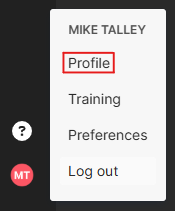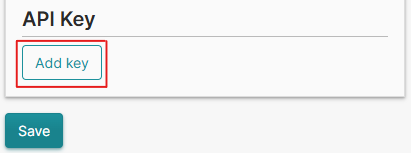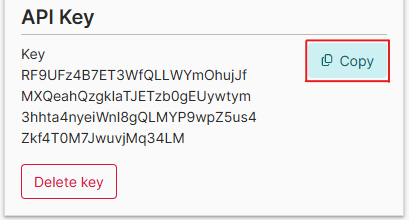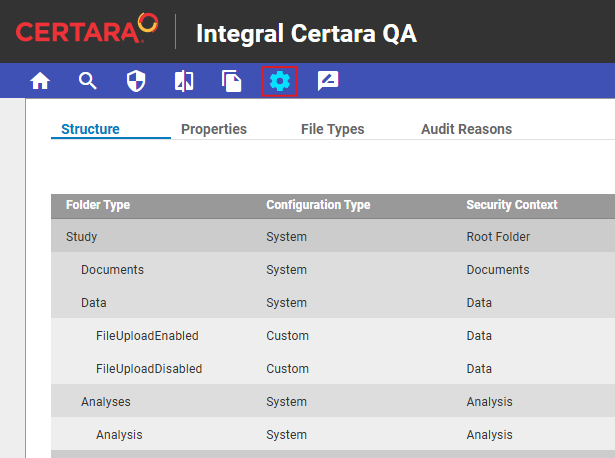Setup
CAD Authentication
To interact with an Integral repository from R, you will need to
supply your CAD authentication credentials, which are store in the form
of an API key. This key is unique to you and is the equivalent of your
login information, so make sure to not save it anywhere that other
people may have access to (like inside an R script). To keep this key
secure, we will save it in your .Renviron so that the
IntegralR functions can supply the credentials directly to the Integral
repository.
First, log in in to your Certara.net account and navigate to your profile page.

From there, scroll to the bottom left of your profile. Generate an API key and copy it to your clipboard.


Back in your R console, open your .Renviron to add your
API key.
# Open .Renviron to add API key
if (!requireNamespace("usethis", quietly = TRUE)) {
install.packages("usethis")
}
usethis::edit_r_environ()You will need to add the following line, making sure to replace the API key below with the one copied from your clipboard.
CAD_API_KEY="RF9UFz4B7ET3WfQLLWYmOhujJfMXQeahQzgkIaTJETzb0gEUywtym3hhta4nyeiWnl8gQLMYP9wpZ5us4Zkf4T0M7JwuvjMq34LM"Save your .Renviron file and restart
R/RStudio to finish the setup.
Repository Configuration
While all IntegralR functions accept the URL of the Integral
repository as an argument, it is typically easier to configure this
option globally in your .Rprofile. This will eliminate the
need to supply the URL every time you use an IntegralR function.
# Open .Rprofile for editing
usethis::edit_r_profile()Next, add the following line to your .Rprofile file.
Note that the value assigned to integral_url should
correspond to the URL that you are using in the web application.
See example:
options("integral_url" = "https://certara.integral.qa.certara.net")You will also need to save and restart R/RStudio to save any changes
you make to .Rprofile.
Usage
Create Folders
To create new root folders in the Integral repository, you can use
the create_root_folder() function, making sure to supply a
folder type. For a list of types available in your
repository, use get_folder_types().
get_folder_types()
create_root_folder(
name = "Root Folder",
type = "Study"
)## Integral Folder Types
##
## Integral URL: https://certara.integral.qa.certara.net
##
## Types:
##
## Study
## Library
## Data
## Documents
## Model Type
## Model File Type
## Folder
## Analyses
## Analysis
## Legacy Study
## Scenarios
## Scenario
## Study Objects
## Study Views
## Study View
## Legacy Library
## CUSTOM
## FileUploadEnabled
## FileUploadDisabled
## TEST
## Project
## SYSTEM
## NONE## Successfully created root folder 'Root Folder'You can also add a sub folder by using
create_subfolder(). If you encounter errors in creating a
sub folder, be sure to check the permissible folder type structure from
within the Administration tab of your Integral repository.
create_subfolder(
path = "Root folder/Data",
name = "sub_folder"
)## Successfully created subfolder 'sub_folder'
Adding Additional Fields
Information for all the other fields that are seen when creating
folders from within the Integral web application can be added as well.
To see the available fields and accepted values, use
get_folder_type_attributes() and
get_folder_type_values(). These values can be passed as
additional arguments when creating the folder.
# Check which fields are required
get_folder_type_attributes(type = "Study")
# Check what values are allowed within each field
get_folder_type_values(type = "Study")
# Create folders
create_root_folder(
name = "Root Folder",
type = "Study",
attribute = "value"
)
create_subfolder(
path = "Root folder/Data",
name = "sub_folder",
attribute = "value"
)## Integral Folder Type Attributes
##
## Integral URL: https://certara.integral.qa.certara.net
##
## Folder Type: Study
##
## Attributes:
##
## Name Required
## Client FALSE
## Compound FALSE
## Indication FALSE
## Portfolio FALSE
## Study Type FALSE
## Study Design FALSE
## Therapeutic Area FALSE
## Group FALSE
## Program FALSE
## Phase FALSE
## Reason FALSE
## custom FALSE
## Project FALSE
## Start Date FALSE
## Description FALSE## Integral Folder Type Values
##
## Integral URL: https://certara.integral.qa.certara.net
##
## Folder Type: Study
##
## Values:
##
## Client: Any
## Compound: Any
## Indication: Any
## Portfolio: Any
## Study Type: "ADME" | "Clinical" | "Pre-Clinical"
## Study Design: "Crossover" | "Dose Response" | "Parallel" | "Randomized"
## Therapeutic Area: Any
## Group: Any
## Program: Any
## Phase: "Phase I" | "Phase II" | "Phase III" | "Phase IV" | "Pre-Clinical"
## Reason: Any
## custom: "FALSE" | "TRUE"
## Project: Any
## Start Date: Any
## Description: Any## Successfully created root folder 'Root Folder'## Successfully created subfolder 'sub_folder'Check Repository Contents
If you need to find a root folder that already exists in an Integral
repository, you can use get_root_folders(). This will
return a list of all the root folders in the repository, along with some
information about the folder properties.
# Get list of root folders in Integral repository
roots <- get_root_folders()
# Print the first 5 entries
print(roots, n = 5)## Repository Root Folders
##
## Integral URL: https://certara.integral.qa.certara.net
##
## Name Created Modified Revision Type Locked Blinded
## _Revert 2025-04-10T14:21:55 2025-04-10T14:21:55 1 Study FALSE FALSE
## 001New 2025-03-10T18:59:26 2025-03-10T18:59:26 1 Study FALSE FALSE
## 002 2025-03-11T17:14:59 2025-03-11T17:14:59 1 Study FALSE FALSE
## 003 2025-03-12T12:31:33 2025-03-12T12:31:33 1 Study FALSE FALSE
## 004 2025-03-31T13:41:03 2025-03-31T13:41:03 1 Study FALSE FALSESimilarly, you can explore the contents of a folder (or sub folder)
by passing the folder name to get_children_of_folder().
This will return information on the children files and folders of the
supplied parent folder.
get_children_of_folder(path = "Root Folder/Data")## Folder Children
##
## Integral URL: https://certara.integral.qa.certara.net
##
## Parent Folder (UUID): Root Folder/Data (55717c19-8d36-40fd-b963-42ad7305480d)
##
## Name Created Modified Revision Object.Type Folder.Type Savepoint.Container Locked Blinded
## airquality.csv 2025-03-28T19:35:21 2025-03-28T19:35:21 1 File FALSE TRUE FALSE
## cars.csv 2025-03-28T19:34:49 2025-03-28T19:34:49 1 File FALSE TRUE FALSE
## DM.xpt 2025-03-28T19:38:41 2025-03-28T19:38:41 1 File FALSE TRUE FALSE
## finaldat.rds 2025-03-28T19:41:57 2025-03-28T19:41:57 1 File FALSE TRUE FALSE
## mtcars.csv 2025-03-31T18:13:06 2025-03-31T18:13:06 1 File FALSE TRUE FALSE
## my_data.csv 2025-03-28T19:31:46 2025-03-28T19:31:46 1 File FALSE TRUE FALSE
## sub_folder 2025-03-28T19:30:46 2025-03-28T19:30:46 1 Folder Folder FALSE TRUE FALSEDownload File
Use the function integral_download() to download a file
from Integral. The file argument corresponds to the file
path in Integral, which can be copied to your clipboard directly from
Integral. Use the path argument to specify the download
location on your file system.
integral_download(
file = "Root Folder/Data/my_data.csv",
path = getwd()
)If you’d like to save the file under a different name, you can
specify the desired file name directly in the path
argument, as shown below.
integral_download(
file = "Root Folder/Data/my_data.csv",
path = file.path(getwd(), "my_data_2.csv")
)Multiple files can be downloaded by specifying a character vector of
Integral file paths to the file argument.
files_to_download <- c("Root Folder/Data/airquality.csv",
"Root Folder/Data/cars.csv")
integral_download(
file = files_to_download,
path = getwd()
)Read Data
You can read data from a remote Integral repository directly into
your R environment using the function integral_read. Use
the FUN argument to specify the correct data import
function given the type of file being imported, e.g., for a
.csv file use read.csv, for an
.xpt file use haven::read_xpt, etc.
Example importing a csv file using the read.csv function
in base R.
my_data <- integral_read(FUN = read.csv,
file = "Root Folder/Data/my_data.csv")Use the ... to add additional arguments corresponding to
the function specified in FUN, e.g.,
my_data <- integral_read(
FUN = read.csv,
file = "Root Folder/Data/my_data.csv",
col.names = c(
"id",
"nom_time",
"act_time",
"amount",
"conc",
"age",
"bw",
"sex"
),
na.strings = ".",
numerals = "no.loss"
)Example importing a .xpt file using the
read_xpt function from the haven package.
if (!requireNamespace("haven", quietly = TRUE)) {
install.packages("haven")
}
DM <- integral_read(FUN = haven::read_xpt,
file = "Root Folder/Data/DM.xpt")Example importing a .Rds file using the
readRds function from base R.
rds_data <- integral_read(FUN = readRDS,
file = "Root Folder/Data/finaldat.RDS")Upload File
Use the file argument to specify the path to the file in
your file system. Use the path argument to specify the
directory name or file path in the remote Integral repository.
Upload a single file.
write.csv(mtcars, "mtcars.csv")
integral_upload(file = "mtcars.csv",
path = "Root Folder/Data/mtcars.csv")Create plots and upload multiple files.
png(file = "mtcars_mpg_vs_wt.png", width = 800, height = 600)
plot(mtcars$wt, mtcars$mpg,
xlab = "Weight (1000 lbs)",
ylab = "Miles/(US) gallon",
main = "Vars: MPG vs. Weight",
pch = 19)
dev.off()
png(file = "mtcars_mpg_vs_hp.png", width = 800, height = 600)
plot(mtcars$hp, mtcars$mpg,
xlab = "Horsepower",
ylab = "Miles/(US) gallon",
main = "Vars: MPG vs. Horsepower",
pch = 19)
dev.off()
integral_upload(file = c("mtcars_mpg_vs_hp.png", "mtcars_mpg_vs_wt.png"),
path = "Root Folder/Data")Write Data
The integral_write function allows you to export objects
e.g., data.frame written to a .csv file in
Integral, directly from R. Use the x argument to specify an
object available in your R environment. The FUN argument
should specify the correct data writing function given the type of file
being exported, e.g., for a .csv file use
write.csv. Use the path argument to specify
the file path in the remote Integral repository.
data <- mtcars
integral_write(x = data,
FUN = write.csv,
path = "Root Folder/Data/mtcars.csv",
reason = "add more data")Since Integral was designed to keep track of file revisions, writing and uploading of files more than once will return an error if the file has not changed. This prevents Integral from changing the revision count when the file in question was not actually revised.